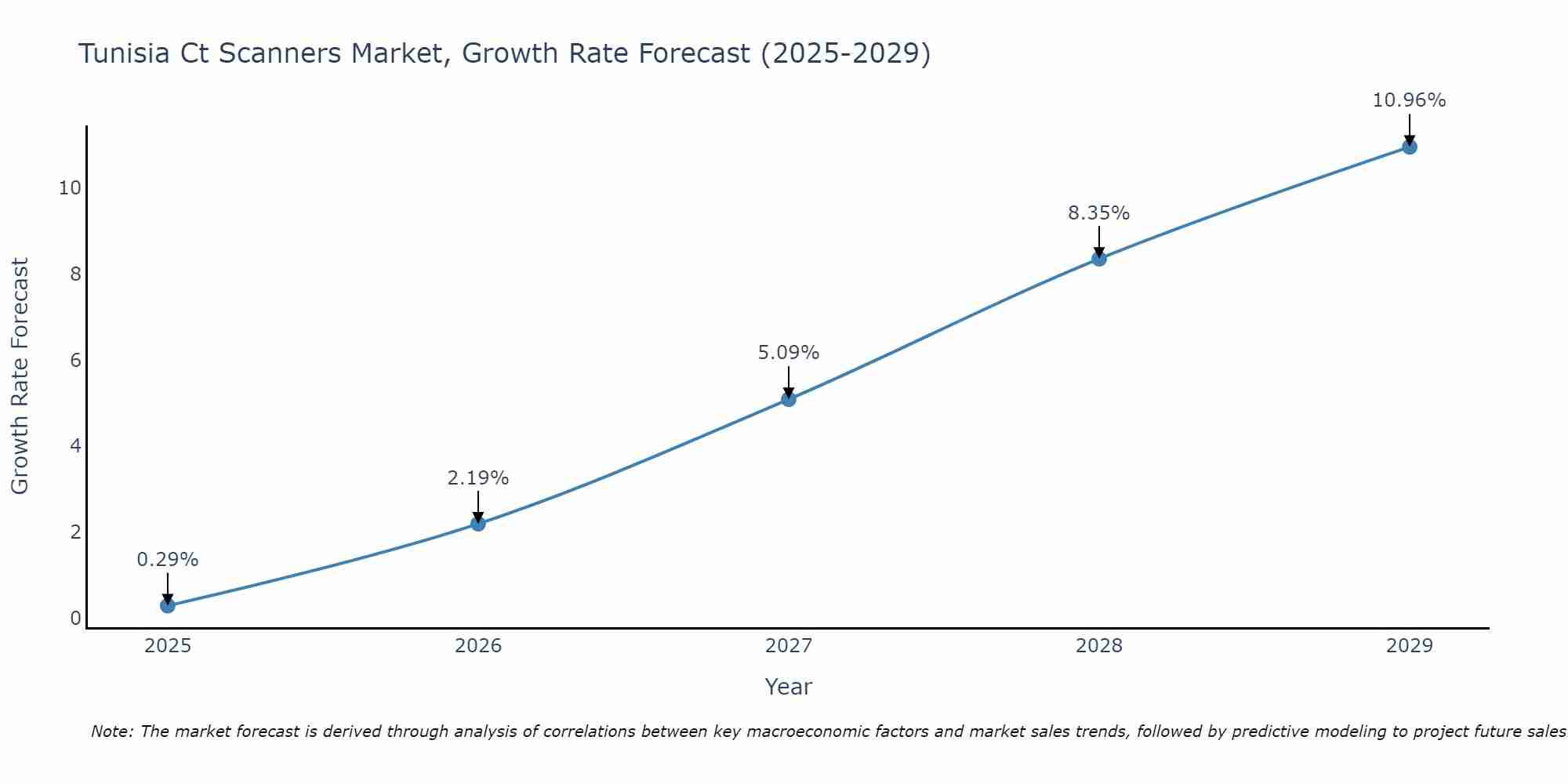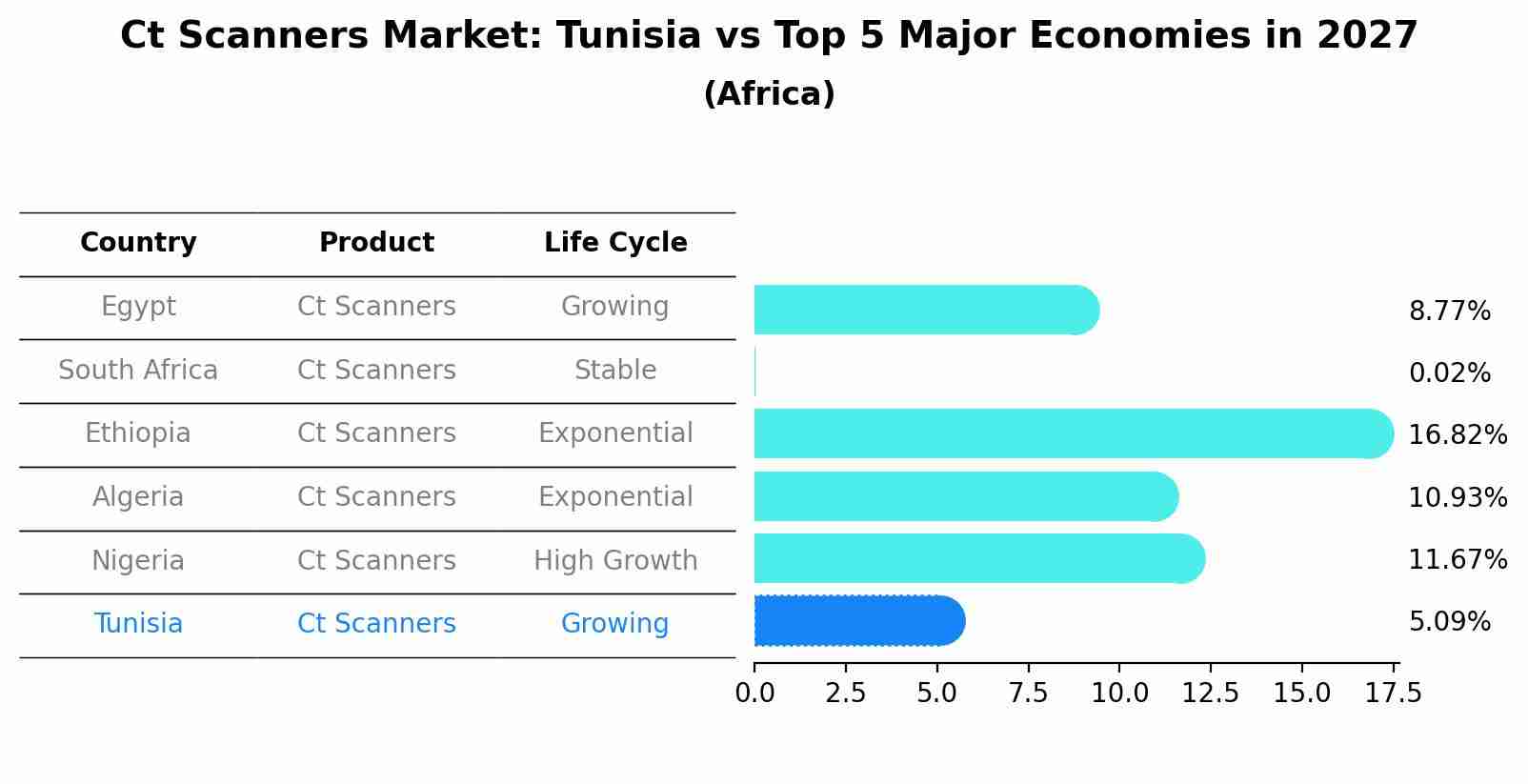Tunisia Ct Scanners Market (2025-2031) Outlook | Revenue, Companies, Analysis, Trends, Value, Share, Industry, Forecast, Growth & Size
| Product Code: ETC362814 | Publication Date: Aug 2022 | Updated Date: Aug 2025 | Product Type: Market Research Report | |
| Publisher: 6Wresearch | Author: Bhawna Singh | No. of Pages: 75 | No. of Figures: 35 | No. of Tables: 20 |
Tunisia Ct Scanners Market Size Growth Rate
The Tunisia Ct Scanners Market is likely to experience consistent growth rate gains over the period 2025 to 2029. From 0.29% in 2025, the growth rate steadily ascends to 10.96% in 2029.

Ct Scanners Market: Tunisia vs Top 5 Major Economies in 2027 (Africa)
By 2027, the Ct Scanners market in Tunisia is anticipated to reach a growth rate of 5.09%, as part of an increasingly competitive Africa region, where Egypt remains at the forefront, supported by South Africa, Ethiopia, Algeria and Nigeria, driving innovations and market adoption across sectors.

Tunisia Ct Scanners Market Synopsis
The Tunisia CT scanners market is experiencing steady growth driven by increasing healthcare infrastructure development and a rising prevalence of chronic diseases. The demand for advanced diagnostic imaging technologies, such as CT scanners, is also on the rise due to the country`s focus on improving healthcare services. Key players in the market are introducing innovative products with enhanced imaging capabilities to cater to the growing demand for accurate and efficient diagnostic solutions. Government initiatives to modernize healthcare facilities and investments in medical technology are further fueling market growth. However, challenges such as high equipment costs and limited access to advanced healthcare facilities in rural areas are hindering the market`s full potential. Overall, the Tunisia CT scanners market presents opportunities for both domestic and international manufacturers to expand their presence and cater to the evolving healthcare needs of the country.
Tunisia Ct Scanners Market Trends
The Tunisia CT scanners market is experiencing growth due to increasing demand for advanced medical imaging technology, rising prevalence of chronic diseases, and government initiatives to improve healthcare infrastructure. There is a growing adoption of multi-slice CT scanners for faster imaging and improved diagnostic accuracy. The market is also witnessing a shift towards portable and compact CT scanners for better accessibility in remote areas and emergency settings. Technological advancements such as AI integration for image reconstruction and analysis are further driving market growth. Additionally, partnerships between healthcare providers and technology companies to enhance diagnostic capabilities and improve patient outcomes are shaping the market landscape in Tunisia. Increased focus on preventive healthcare and early disease detection is expected to drive further market expansion in the coming years.
Tunisia Ct Scanners Market Challenges
In the Tunisia CT scanners market, some of the challenges faced include high costs associated with CT technology acquisition, maintenance, and operation, leading to limited accessibility for smaller healthcare facilities. Additionally, there may be a shortage of skilled professionals capable of operating and interpreting CT scans effectively, resulting in potential delays in diagnosis and treatment. Regulatory hurdles and lack of standardized protocols for CT scan procedures can also hinder market growth and adoption. Furthermore, the ongoing COVID-19 pandemic has strained healthcare resources and budgets, potentially impacting the investment and expansion of CT scanner technology in Tunisia. Overall, addressing these challenges will be crucial in ensuring the continued advancement and utilization of CT scanners in the Tunisian healthcare system.
Tunisia Ct Scanners Market Investment Opportunities
The Tunisia CT scanners market presents promising investment opportunities due to the increasing demand for advanced medical imaging technologies in the country. With the rising prevalence of chronic diseases and the growing focus on early disease detection, there is a significant need for high-quality diagnostic tools like CT scanners. Investors can capitalize on this demand by investing in CT scanner manufacturers, distributors, or service providers in Tunisia. Additionally, the government`s initiatives to improve healthcare infrastructure and access to medical services further support the growth potential of the CT scanners market in the country. By leveraging these factors and staying abreast of technological advancements in the field, investors can tap into the lucrative opportunities offered by the Tunisia CT scanners market.
Jordan Agar Market Government Policies
Government policies related to the Tunisia CT Scanners market include regulations set by the Ministry of Health governing the import, sale, and use of CT scanners to ensure their safety, efficacy, and compliance with international standards. The government also promotes investments in healthcare infrastructure to enhance diagnostic capabilities, including the acquisition of advanced medical imaging equipment such as CT scanners. In addition, there may be tax incentives or subsidies available to healthcare facilities investing in CT scanners to improve access to quality healthcare services. Overall, the government`s focus on improving healthcare services and infrastructure in Tunisia plays a significant role in shaping the CT scanners market and driving growth in the sector.
Tunisia Ct Scanners Market Future Outlook
The Tunisia CT scanners market is expected to witness steady growth in the coming years due to increasing healthcare expenditure, rising prevalence of chronic diseases, and technological advancements in imaging technologies. The market is likely to be driven by the growing demand for early and accurate diagnosis, as well as the need for advanced medical imaging equipment in healthcare facilities across the country. Furthermore, the government`s initiatives to improve healthcare infrastructure and access to quality healthcare services are anticipated to boost the adoption of CT scanners in Tunisia. However, challenges such as high costs associated with CT scanners and limited healthcare resources in some regions may hinder market growth to some extent. Overall, the Tunisia CT scanners market is projected to show promising growth opportunities in the foreseeable future.
Key Highlights of the Report:
- Tunisia Ct Scanners Market Outlook
- Market Size of Tunisia Ct Scanners Market, 2024
- Forecast of Tunisia Ct Scanners Market, 2031
- Historical Data and Forecast of Tunisia Ct Scanners Revenues & Volume for the Period 2021 - 2031
- Tunisia Ct Scanners Market Trend Evolution
- Tunisia Ct Scanners Market Drivers and Challenges
- Tunisia Ct Scanners Price Trends
- Tunisia Ct Scanners Porter's Five Forces
- Tunisia Ct Scanners Industry Life Cycle
- Historical Data and Forecast of Tunisia Ct Scanners Market Revenues & Volume By Type for the Period 2021 - 2031
- Historical Data and Forecast of Tunisia Ct Scanners Market Revenues & Volume By Stationary CT scanners for the Period 2021 - 2031
- Historical Data and Forecast of Tunisia Ct Scanners Market Revenues & Volume By Portable CT scanners for the Period 2021 - 2031
- Historical Data and Forecast of Tunisia Ct Scanners Market Revenues & Volume By Device Architecture for the Period 2021 - 2031
- Historical Data and Forecast of Tunisia Ct Scanners Market Revenues & Volume By C-arm CT Scanners for the Period 2021 - 2031
- Historical Data and Forecast of Tunisia Ct Scanners Market Revenues & Volume By O-arm CT Scanners for the Period 2021 - 2031
- Historical Data and Forecast of Tunisia Ct Scanners Market Revenues & Volume By Technology for the Period 2021 - 2031
- Historical Data and Forecast of Tunisia Ct Scanners Market Revenues & Volume By High-slice CT for the Period 2021 - 2031
- Historical Data and Forecast of Tunisia Ct Scanners Market Revenues & Volume By Mid-slice CT for the Period 2021 - 2031
- Historical Data and Forecast of Tunisia Ct Scanners Market Revenues & Volume By Low-slice CT for the Period 2021 - 2031
- Historical Data and Forecast of Tunisia Ct Scanners Market Revenues & Volume By Cone-beam CT for the Period 2021 - 2031
- Historical Data and Forecast of Tunisia Ct Scanners Market Revenues & Volume By Application for the Period 2021 - 2031
- Historical Data and Forecast of Tunisia Ct Scanners Market Revenues & Volume By Human Application for the Period 2021 - 2031
- Historical Data and Forecast of Tunisia Ct Scanners Market Revenues & Volume By Diagnostic Applications for the Period 2021 - 2031
- Historical Data and Forecast of Tunisia Ct Scanners Market Revenues & Volume By Cardiology Applications for the Period 2021 - 2031
- Historical Data and Forecast of Tunisia Ct Scanners Market Revenues & Volume By Oncology Applications for the Period 2021 - 2031
- Historical Data and Forecast of Tunisia Ct Scanners Market Revenues & Volume By Neurology Applications for the Period 2021 - 2031
- Historical Data and Forecast of Tunisia Ct Scanners Market Revenues & Volume By Intraoperative Applications for the Period 2021 - 2031
- Historical Data and Forecast of Tunisia Ct Scanners Market Revenues & Volume By Veterinary Application for the Period 2021 - 2031
- Historical Data and Forecast of Tunisia Ct Scanners Market Revenues & Volume By Research Application for the Period 2021 - 2031
- Tunisia Ct Scanners Import Export Trade Statistics
- Market Opportunity Assessment By Type
- Market Opportunity Assessment By Device Architecture
- Market Opportunity Assessment By Technology
- Market Opportunity Assessment By Application
- Tunisia Ct Scanners Top Companies Market Share
- Tunisia Ct Scanners Competitive Benchmarking By Technical and Operational Parameters
- Tunisia Ct Scanners Company Profiles
- Tunisia Ct Scanners Key Strategic Recommendations
Frequently Asked Questions About the Market Study (FAQs):
- Single User License$ 1,995
- Department License$ 2,400
- Site License$ 3,120
- Global License$ 3,795
Search
Thought Leadership and Analyst Meet
Our Clients
Related Reports
- Germany Breakfast Food Market (2026-2032) | Industry, Share, Growth, Size, Companies, Value, Analysis, Revenue, Trends, Forecast & Outlook
- Australia Briquette Market (2025-2031) | Growth, Size, Revenue, Forecast, Analysis, Trends, Value, Share, Industry & Companies
- Vietnam System Integrator Market (2025-2031) | Size, Companies, Analysis, Industry, Value, Forecast, Growth, Trends, Revenue & Share
- ASEAN and Thailand Brain Health Supplements Market (2025-2031) | Strategy, Consumer Insights, Analysis, Investment Trends, Opportunities, Growth, Size, Share, Industry, Revenue, Segments, Value, Segmentation, Supply, Forecast, Restraints, Outlook, Competition, Drivers, Trends, Demand, Pricing Analysis, Competitive, Strategic Insights, Companies, Challenges
- ASEAN Bearings Market (2025-2031) | Strategy, Consumer Insights, Analysis, Investment Trends, Opportunities, Growth, Size, Share, Industry, Revenue, Segments, Value, Segmentation, Supply, Forecast, Restraints, Outlook, Competition, Drivers, Trends, Demand, Pricing Analysis, Competitive, Strategic Insights, Companies, Challenges
- Europe Flooring Market (2025-2031) | Outlook, Share, Industry, Trends, Forecast, Companies, Revenue, Size, Analysis, Growth & Value
- Saudi Arabia Manlift Market (2025-2031) | Outlook, Size, Growth, Trends, Companies, Industry, Revenue, Value, Share, Forecast & Analysis
- Uganda Excavator, Crane, and Wheel Loaders Market (2025-2031) | Strategy, Consumer Insights, Analysis, Investment Trends, Opportunities, Growth, Size, Share, Industry, Revenue, Segments, Value, Segmentation, Supply, Forecast, Restraints, Outlook, Competition, Drivers, Trends, Demand, Pricing Analysis, Competitive, Strategic Insights, Companies, Challenges
- Rwanda Excavator, Crane, and Wheel Loaders Market (2025-2031) | Strategy, Consumer Insights, Analysis, Investment Trends, Opportunities, Growth, Size, Share, Industry, Revenue, Segments, Value, Segmentation, Supply, Forecast, Restraints, Outlook, Competition, Drivers, Trends, Demand, Pricing Analysis, Competitive, Strategic Insights, Companies, Challenges
- Kenya Excavator, Crane, and Wheel Loaders Market (2025-2031) | Strategy, Consumer Insights, Analysis, Investment Trends, Opportunities, Growth, Size, Share, Industry, Revenue, Segments, Value, Segmentation, Supply, Forecast, Restraints, Outlook, Competition, Drivers, Trends, Demand, Pricing Analysis, Competitive, Strategic Insights, Companies, Challenges
Industry Events and Analyst Meet
Whitepaper
- Middle East & Africa Commercial Security Market Click here to view more.
- Middle East & Africa Fire Safety Systems & Equipment Market Click here to view more.
- GCC Drone Market Click here to view more.
- Middle East Lighting Fixture Market Click here to view more.
- GCC Physical & Perimeter Security Market Click here to view more.
6WResearch In News
- Doha a strategic location for EV manufacturing hub: IPA Qatar
- Demand for luxury TVs surging in the GCC, says Samsung
- Empowering Growth: The Thriving Journey of Bangladesh’s Cable Industry
- Demand for luxury TVs surging in the GCC, says Samsung
- Video call with a traditional healer? Once unthinkable, it’s now common in South Africa
- Intelligent Buildings To Smooth GCC’s Path To Net Zero


















